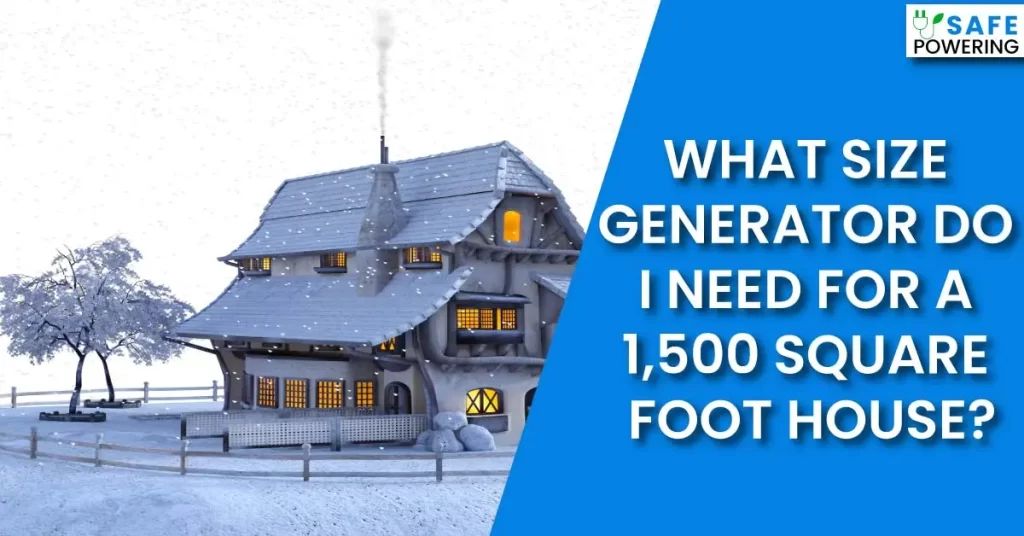What Size Generator To Run A 1500 Sq Ft House?
This article aims to answer your queries about “What Size Generator To Run A 1500 Sq Ft House? What factor should we take into account before making a buying decision and how can we calculate our powering needs in an instant?
A 5 – 8kW generator would be ideal for a 1500 Sq Ft House with a bunch of Basic appliances like a Coffee maker, refrigerator, Microwave, 1 -2 ton Air conditioner, LED bulbs, TVs, Electric Stove, Chargers, Toaster, etc.

What Size Generator To Run A 1500 Sq Ft House?
The sizing of the generator is solely dependent on how many appliances a house owner wants to operate and also how much starting and running watt each appliance will consume.
Before making a buying decision we encourage doing the wattage calculations first.
Surge/Starting Watts: Maximum wattages a machine could produce for an instant to ignite the heavy-duty motorized/compressor-based appliances. Starting wattages will always be higher compared to Rated watts.
Running/Rated Watts: Maximum wattages a generator could produce continuously to run the appliances in stable condition.
Calculate the Wattage Requirements:
- Note down the all appliances of the house with their starting and running watts. Nameplate or energy labeling would be a helping hand to find out the accurate power ratings.
- If the power ratings are in Amps and you are not familiar with the calculations make sure to convert the amps into watts by using the Ohms law.
Ohm‘s Law: W (Watts) = A (Ampere) X V (Volts)
E.g.: An appliance is consuming 20 rated and 22 surge amps at the voltage of 120V.
Ohm’s Law: W = A X V
Running watts = 20—120 = 2400W
Starting watts = 22—120 = 2640W
- Sum up the power ratings of all appliances and keep them In a separate column.
- Finally, Compare the calculated wattages of the appliances with the power ratings of the generator you are going to own.
Estimated Generator Sizes Types:
| Generator Type | Ideal Size For A 1500 Square Foot House |
|---|---|
| Standby Generator | 10 – 15 kW |
| Portable/Inverter Generator | 5 – 10 kW |
| Solar Generator | 3-7 kW (Not Recommended For a House) |
1. Portable Generators for A 1500-sq ft House:
A 5 – 8kW portable generator would be enough for a 1500 square foot house with some of the basic appliances like a Coffee maker, refrigerator (Perfect generator size to run a refrigerator), Microwave, air conditioner, LED bulbs, TVs, Electric Stove, Chargers, etc.
NOTE: If you want to operate most of the power-hungry appliances simultaneously make sure to consider a bigger unit ranging from 10 to 15kw.
2. Standby Generators for a 1,500-square-foot house:
Because of the multiple fuel options, larger fuel tanks, decent efficiencies, and massive power outputs a standby generator is built to cope with the extended blackouts.
As per my experience, a 10 – 15kw standby gen set would be more than enough for a 1,500-square-foot house even if you are going to operate most of the appliances simultaneously.
Recommended Guide: What Size Generator Do I Need For A 2000 Square Foot House?
How to Buy a Generator for a 1,500 sq. Ft House?
Desired Power Ratings:
The selected machine should have sufficient power ratings (stating and running watts) so that you can operate all of the appliances smoothly.
We encourage you to do a power calculation of your household first to make sure your chosen one would be more than enough for your house.
Lower THD (Total Harmonic Distortion):
Like a human, an appliance needs uncontaminated steady power with minimum THD levels.
As per our tests a genset with <5% of THD levels would be ideal for voltage-sensitive appliances like UPS, chargers, laptops, etc Though modern appliances have a protective mechanism to cope with unsteady voltages efficiently, still I found some of my beloved appliances burned because of the unsteady voltage.
Runtime/Efficiency:
The efficient generator wouldn’t only last longer but also save your fuel cost. For me, a brandable machine with a super-efficient engine should be at 1st priority.
As a general thumb rule a generator that provides 7 – 10 hours of runtime at 30% – 50% load is considered an efficient one.
NOTE: Runtime depends on many factors like load, fuel tank size, generator Type, maintenance, etc.
With an increased load you may have to compromise on the fuel, also if the generator has a small fuel tank you have to refill the fuel tank again and again.
In addition to that, the latest inverter machines with RPM-regulated sensors like ECO modes are consuming less fuel compared to the old open-frame machines.
Durability, Warranty, and Customer Support:
The short-listed generator should be from a well-known brand with a decent warranty and customer support.
I prefer to select a machine with at least 3 years of warranty and also built from high-grade non-corrosive material so that it can sustain harsh weather and higher loads.
Fuel Options:
Multiple fuel options will be a plus point for the users who don’t want to refill the gasoline tank again and again; also you will always have option “B” or “C” once you run out of gasoline.
We recommend going for a Tri fuel or at least a dual Fuel machine so that you will always have the option to fire up the machine even if you are in the countryside where there is no availability of gasoline.
Noise:
Extremely loaded machines will not only be irritating for the family but also for the neighbors as well.
We recommend selecting a generator that shouldn’t emit more than 60 – 65dB (A) on average at 30% – 40% load from a distance of 25 – 30 ft.
NOTE: Noise levels solely depend on the distance and the load on the generator; also open-frame traditional generators emit more noise compared to inverter generators with perfect enclosures.
Safety Features:
A generator with various certifications from the most renowned environmental brands like EPA and CARB would not only keep your appliances happy but also protect the environment from hazardous fumes.
Additionally, the selected unit must have modern safety features like low oil and overload protections, CO sensors, GFCI breakers, etc.
Portability and Mobility:
A Portable machine with a decent mobility kit is like a saver for those who want to use the machine for multiple purposes like camping, boating, tailgating, etc.
NOTE: Portability and mobility kit can be compromised if the generator sits at a dedicated place in the house, however, if you have to move it around more often, consider a portable machine.
Recommended Guide: What Size Generator Do I Need to Run a House?
Recommended Best Generators for 1500 Sq Ft House?
| No | Generator Model | Starting and Running Watts | Fuel Type | Noise at High Load | Fuel Tank | Best For | Price |
|---|---|---|---|---|---|---|---|
| 1 | DuroMax XP5500HX Dual Fuel | 5500/4500 | Dual fuel | 74 to 75 dB(A) | 4 Gallons | Normal Usage | Check Price |
| 2 | Champion Power Equipment 100891 | 9375/7500 | Dual fuel | 74 dB(A) | 7.7 Gallons | Normal Usage | Check Price |
| 3 | Westinghouse WGen9500DF | 12500/9500 | Dual fuel | 74 to 76 dB(A) | 6.6 Gallons | High Usage | Check Price |
| 4 | Generac 7043 Home Standby Generator | 22kW/19.5kW | Propane/Natural Gas | 67 – 68 dB(A) | Nil | High Usage | Check Price |
Recommended Read: What size generator do I need for a 100 amp service?
Final Words
Though 5 -8 kW would be enough for a 1,500 sq. ft. house with some of the basic appliances, still we recommend doing the wattage calculation first before making the buying decision so that the newly purchased machine would draw enough power to satisfy your powering needs.
Frequently Asked Questions – FAQs
How Many kW for a 1500 sq ft House?
It depends on the number of appliances and how many of them will be operated simultaneously, we recommend doing the basic wattage calculation by following this section of the article. As a general thumb rule a 5 – 8kW machine would be enough for a 1500 sq. ft. House.
How Much is a Generator for a 1500 sq ft House?
The price tags of the gen set vary as per the size, modern features, and brand of the generator, Typically a solid machine for 1,500 square foot house will cost you between $800 to $3,000.

Kashif has been a valuable asset to the electric generator industry for over 5 years. Now, As a skilled energy engineer, he’s been on the front lines of diagnosing problems, fixing broken parts, and performing routine maintenance tasks to keep generators running smoothly.
